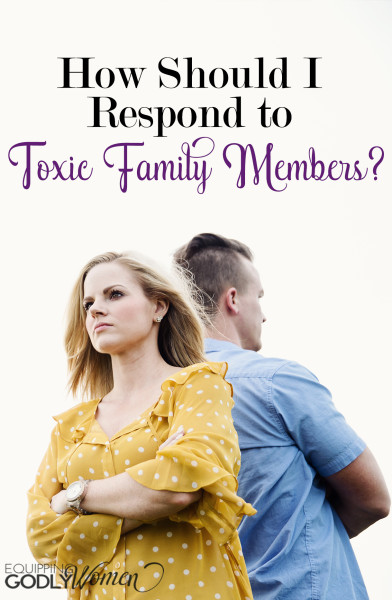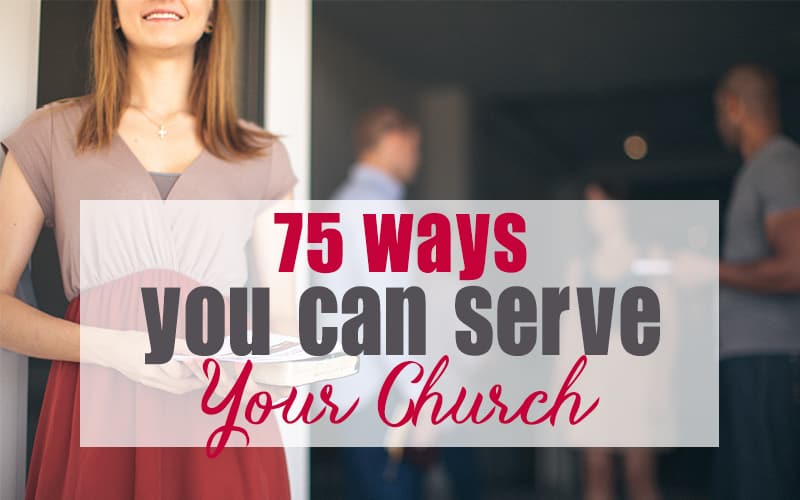How to Deal With Toxic Family Members Biblically (7 Steps)

Do you have certain family members you can’t stand to be around?
While it’s normal to have the occasional conflict or annoyance, if you’re dealing with toxic family members (whether parents, in-laws, siblings, or even young or adult children), the issue goes far beyond a simple annoyance.
When family members are simply annoying, you can often choose to overlook their faults. It’s not that big of a deal. If you’re struggling to know how to deal with toxic family members biblically, however, simply ignoring the bad behavior won’t help.
For one Equipping Godly Women reader, her toxic family members show blatant favoritism.
“My relationship with my family isn’t a healthy one. Both my parents and my siblings clearly favor my sister and her kids over me and mine, and it hurts me and my kids the way this favoritism is displayed.
For example, they don’t visit me unless they need favors, and they brush my concerns aside when I try to share how their actions make me feel. My feelings are minimized, dismissed and discarded. It’s hurtful.
Even my kids are aware of this blatant favoritism. They ask questions about why their cousins get more attention, etc., and it breaks my heart.
I want to remain respectful to my parents and siblings, yet this has been happening for over five years now with no signs of remorse, and I don’t know how to make them understand how hurtful their actions are to me and my children.
I don’t want to go against God’s words or teachings. How do I deal with toxic family members biblically?”
If you’re struggling to figure out how to deal with toxic family members biblically, you’re not alone.
Maybe you’ve been wondering, “What does the Bible say about toxic family members?”
Maybe you’ve even been Googling questions like, “What does the Bible say about evil family members?” or “When should a Christian walk away from family?” Or maybe you aren’t sure if you’re dealing with toxic family members at all. (Maybe your family is simply annoying.)
You know you want to be a good Christian and do the right thing, but maybe it seems like no matter how much you love, forgive, ignore their tactics, and turn the other cheek, the mistreatment and manipulation never stops. It only gets worse.
The family dynamic is completely unhealthy, everyone involved is miserable, and nothing is working, no matter how much you try.
You want to be kind, but they’re driving you crazy, and you’re not sure what to do.
So now you’re wondering, “How do I deal with toxic family members biblically??”
Whatever your situation today, there is hope.
In this post, we’ll examine the common warning signs of a toxic relative, what the Bible says about toxic family members, 7 practical tips to help you deal with toxic family members biblically, and a few great resources you’ll want to check out.
*This post contains affiliate links, which means if you make a purchase after clicking through one of my links, I may make a small commission at no additional cost to you. This helps cover the many costs of running this site and allows me to help provide for my growing family. Thank you!
15 Warning Signs You’re Dealing with a Toxic Family Member
While it may seem hurtful to label your parents, siblings, aunts and uncles, in-laws, or children as “toxic family members,” there’s something incredibly healing and freeing about knowing you’re not crazy and their behavior is not okay.
Common warning signs of toxic family members include:
- They’re abusive (physically, mentally, verbally, sexually, or emotionally).
- They constantly criticize, shame, blame, or belittle others.
- They’re controlling, manipulative, or passive-aggressive.
- They’re constantly annoyed, angry, defensive, or defensive.
- They’re jealous of others’ successes. Everything is a competition.
- They always have to be the center of attention.
- They’re selfish, self-centered, and arrogant.
- They play the victim, are never wrong, and are never at fault.
- They’re dismissive of others’ wants, needs, and opinions.
- They belittle your grief, sadness, frustration, childhood trauma, or current pain.
- Their reactions or emotions are unpredictable, sudden, and intense.
- They give you the silent treatment when they don’t get their way.
- They love drama and will create it where none exists.
- Your home is in constant chaos due to their actions and reactions.
- They don’t respect your healthy boundaries.
- They gaslight you, causing you to question reality.
- You always “lose” in your disagreements, even if it’s not your fault.
- You rarely (or never) feel love, acceptance, or support.
- You’re worried about your physical, emotional, spiritual, or mental health.
- You feel depressed, anxious, exhausted, or unsettled around them.
- You feel like you’re walking on eggshells around them.
If these warning signs perfectly describe someone you know, you may be dealing with a toxic family member.
The vast majority of toxic family members won’t display all of these warning signs. And there’s a difference between the occasional toxic behavior and labeling someone a toxic person.
(We all do dumb things and act in ways we aren’t proud of sometime, and it’s possible to do bad things without being a bad person.)
If your friends and family members are simply annoying, it’s probably best to give them grace and try to overlook their faults. No one’s perfect, and dealing with annoying people can actually help you grow spiritually as you develop patience, understanding, and compassion.
BUT if your toxic family members repeatedly or consistently display these warning signs, it may be time to set boundaries, draw on your support system for help, and/or get therapy from a licensed counselor so you can enjoy a drama-free life again.
No one should have to live in constant fear, depression, anxiety, or dread after spending time with dysfunctional family members. No one should settle for emotional abuse or toxic family dynamics due to others’ sinful choices or addictions.
Related Reading: How to Set Biblical Boundaries as a Christian
How Would God Want Me to Deal with Toxic Family Members as a Christian?

Do you ever wonder, “What would God want me to do in this situation?”
Should I try to repair my relationships with toxic family members? Set boundaries? Walk away and cut them out of my life?
I wrote my latest book to help YOU!
In Follow God’s Will: Biblical Guidelines for Everyday Life, we take a deep dive into how you can know (with relative certainty) exactly what God wants you to do in the difficult or confusing situations you face each day.
Practical, encouraging, and full of biblical truth, Follow God’s Will is designed to help you answer questions including:
- What does God want me to do personally?
- How do I apply the Bible’s instructions to my life today?
- What would God want me to do in the difficult situations I face each day?
- How should I navigate relationships with those who think, act, or believe differently than I do?
- And so much more!
Want to start reading for free?
Simply enter your first name and best email below, and I’ll send you the first chapter right away!
What Does The Bible Say About Toxic Family Members?
While the Bible does say that we should turn the other cheek, forgive, and love our enemies, it’s important to understand these Scripture verses in context. The Bible does not say that we should allow toxic family members to continually abuse, mistreat, or walk all over us (or our families).
In fact, there are times when the most loving, Christian response is to set boundaries or cut ties with toxic family members in order to protect ourselves and our families and/or so we don’t continue to enable our toxic family members’ selfish, sinful behavior.
While the Bible never uses the exact phrase “toxic family members,” Scripture has a lot to say about how we should treat those who mistreat us, and there’s a lot of (understandably) a lot of nuance to the discussion.
Here’s what the Bible says about toxic family members and those who mistreat us.
Choose Your Companions Wisely (Proverbs 13:20)
“Walk with the wise and become wise,
for a companion of fools suffers harm.”
While you can’t choose your family, you can choose to spend less time around those whose consistent poor choices have a negative impact on your personal faith or witness.
See also: Psalm 1:1, Proverbs 16:29, Proverbs 22:24-25, 1 Corinthians 15:33.
Encourage Others in Good Deeds (Hebrews 10:24-25)
“And let us consider how we may spur one another on toward love and good deeds, not giving up meeting together, as some are in the habit of doing, but encouraging one another—and all the more as you see the Day approaching.”
As Christians, we want to encourage each other to serve the Lord and do what’s right. None of us are perfect. We all need each others’ loving support, correction, and encouragement.
See also: Romans 15:1-2, Colossians 3:16, 1 Thessalonians 5:14, 2 Timothy 4:2, Hebrews 3:13.
Guard Your Faith (2 Peter 3:17)
“Therefore, dear friends, since you have been forewarned, be on your guard so that you may not be carried away by the error of the lawless and fall from your secure position.”
Yet, while we do want to encourage others in the faith, we must be careful that our own faith isn’t badly damaged in the process. Some people are glad for gentle correction. Others will lash out at everyone near them. It’s wise to know the difference.
See also: Matthew 7:6, Proverbs 13:20.
Related Reading: What Does the Bible Say About Self-Care? (A Christian Perspective)
Avoid Toxic Family Members Who Love Drama and Division (Romans 16:17-18)
“I urge you, brothers and sisters, to watch out for those who cause divisions and put obstacles in your way that are contrary to the teaching you have learned. Keep away from them. For such people are not serving our Lord Christ, but their own appetites. By smooth talk and flattery they deceive the minds of naive people.”
You can’t always control how others behave, but you can choose to remove yourself from the situation so you don’t reap their negative consequences as well. The Bible repeatedly warns us to steer clear of other Christians who are bent on doing what’s wrong.
See also: 2 Timothy 2:22-26, Titus 3:9-11.
Love Your Enemies (Luke 6:27-29)
“But to you who are listening I say: Love your enemies, do good to those who hate you, bless those who curse you, pray for those who mistreat you. If someone slaps you on one cheek, turn to them the other also. If someone takes your coat, do not withhold your shirt from them.”
Jesus provides the ultimate example of loving your enemies, but it’s important to note that this passage is in the context of those who persecute you *for your faith.* It does not mean that we must allow everyone to mistreat us. Love does not mean “be a doormat.”
The famous love passage, 1 Corinthians 13:4-7, tells us that:
“Love is patient, love is kind. It does not envy, it does not boast, it is not proud. It does not dishonor others, it is not self-seeking, it is not easily angered, it keeps no record of wrongs. Love does not delight in evil but rejoices with the truth. It always protects, always trusts, always hopes, always perseveres.”
We can treat others with respect, honor, and dignity–without allowing them to abuse us.
See also: Leviticus 19:18, Romans 12:14, 17-20, 1 Peter 3:9, 1 John 4:7.
Forgive Those Who Hurt You (Matthew 18:21-22)
“Then Peter came to Jesus and asked, ‘Lord, how many times shall I forgive my brother or sister who sins against me? Up to seven times?’ Jesus answered, ‘I tell you, not seven times, but seventy-seven times.'”
Similarly, to “forgive” someone doesn’t mean to say that what they did was right or okay, and it doesn’t mean that we have to maintain a close, healthy relationship with them. Rather, we can forgive someone by releasing our anger and desire for revenge to God. We can hold peace in our hearts, knowing that God will deal with them and their behavior.
See also: Matthew 6:14-15, Mark 11:25, Luke 6:37, Ephesians 4:32, Colossians 3:13.
Don’t Seek Revenge or Repayment for Evil (1 Peter 3:9)
“Do not repay evil with evil or insult with insult. On the contrary, repay evil with blessing, because to this you were called so that you may inherit a blessing.”
This goes right along with our call to forgiveness. We can treat others with honor, dignity, and respect — even if they don’t deserve it. We can take the high road and do what’s right, even if we are the only one who does.
See also: Deuteronomy 32:35, Proverbs 20:22, 1 Thessalonians 5:15.
Pursue Peace, When Possible (Ephesians 4:2-3)
“Be completely humble and gentle; be patient, bearing with one another in love. Make every effort to keep the unity of the Spirit through the bond of peace.”
There are times when it’s important to stand up for justice and do what’s right. There are also times when it simply isn’t worth the fight–either because the issue is small or the other person isn’t likely to listen. While it’s perfectly fine to set Christian boundaries, we should do so in a way that pursues peace, not in a way that retaliates or lashes out at others in anger.
See also: Mark 9:50, Romans 12:16, Romans 15:5-6, Hebrews 12:14, 1 Thessalonians 5:13
Do Not Rejoice Over Others’ Downfall (Proverbs 24:17)
“Do not gloat when your enemy falls;
when they stumble, do not let your heart rejoice”
See also: Obadiah 1:12, Proverbs 17:5, 1 Peter 2:1.
Tired of Being “Nice” to Toxic Family Members? Jesus Wasn’t Always Nice…
Yes, we absolutely should love our enemies. But I think sometimes we forget what love really means.
Loving someone well does not mean always playing “nice,” always being the peacemaker, or just letting other people walk all over you. This isn’t love–it’s called enabling.
A better definition of love would be: honoring the true dignity of another person, acknowledging their inherent worth as human beings, created and loved by God, and doing everything in your power to do good for them and to act in their best interest.
Yes, it absolutely can include being “kind” (see 1 Cor. 13:4-7 again), but it’s so much more than that. And in fact, if you really examine the way Jesus behaves in the Gospels, his actions aren’t always what we consider “nice.”
- When a Canaanite woman asks Jesus for his help in Matthew 15:26, “He replied, ‘It is not right to take the children’s bread and toss it to the dogs.'”
- Jesus tells the Pharisees, “You brood of vipers, how can you who are evil say anything good? For the mouth speaks what the heart is full of” in Matthew 12:34.
- And let’s not forget how “Jesus entered the temple courts and drove out all who were buying and selling there. He overturned the tables of the money changers and the benches of those selling doves” in Matthew 21:12.
Now, I wouldn’t actually recommend you call your in-laws dogs or vipers or flip their tables! My point here is ONLY that the Bible does not teach us that we need to be super polite, calm, and passive to the point of being walked over and enabling others in their sins.
In fact, Jesus instructs the apostles to “leave that home or town and shake the dust off your feet” in Matthew 10:14 and to “treat [unrepentant sinners] as you would a pagan or a tax collector” in Matthew 18:17.
Jesus’s plan for our lives isn’t to make us “nice.” It’s to make us (and our loved ones) holy. Sometimes that means treating others kindly. But other times that means protecting ourselves and our families instead of protecting the feelings of others who insist on pursuing sinful attitudes or behaviors.
See also: Yes, Christians Should Judge
How to Deal With Toxic Family Members Biblically
So since the Bible doesn’t teach us to be passive doormats, how should we deal with toxic family members Biblically?
Here’s what I would advise:
1. Assess the Situation Honestly
Toxic family members are annoying. So it only makes sense that you might get worked up when your friends and family members start showing the signs of a toxic person, or you start noticing the many signs of a toxic relationship.
Before you get too worked up, though, take a step back and assess the situation honestly:
- Is the other person actually toxic, or simply annoying, thoughtless, etc?
- Is the problem serious enough to warrant action, or can you simply overlook it for the sake of family unity?
- Are you sure the other person’s actions are intentional, not simply perceived? (Ex: yelling, disappointment, blame)
- What type of effect is the behavior having on you and your family?
- What have you done to remedy the situation in the past, if anything?
- Have you actually told the other person how you are feeling and what you’d like to change?
- Are things getting better, staying the same, or getting worse?
In the best-case scenario: you may realize that the other party truly didn’t mean to hurt you and that they were unaware that their behavior was coming across so hurtful. If this is the case, then you may simply need to have a conversation.
Alternately, if the behavior is purposeful but small enough in nature, you may simply be able to ignore it or avoid the situation when possible. Life isn’t perfect, people are annoying, and sometimes we just have to deal with annoying people.
Yes, there are absolutely times when you may need to take action (there are times when cutting people out of your life is the right choice to make), but let’s not jump there quite yet.
Can the behavior simply be resolved or overlooked? If so (and the situation isn’t serious), then start here.
Sometimes, it can be really difficult to know if the issue is “bad” enough to consider walking away or if you just need to stay and be more loving.
There truly is no one size fits all answer. And it can be especially difficult to think clearly if your friends and family have engaged in gaslighting, manipulating, or other confusing behaviors.
This is why you absolutely want to seek godly counsel from friends and family who know you well, as well as seek out great books and resources to help you gain more insight into what’s normal and what’s not.
Sometimes you don’t realize how wrong a behavior is if it’s all you’ve known or if it’s what you’re used to.
This is where books like When to Walk Away: Finding Freedom from Toxic People can come in really useful! Written by a pastor, this book (and others like it) can help you figure out your situation while still staying true to biblical principles.
2. Accept Responsibility for Any Wrongdoing on Your Part
Next, let’s take a minute to look at yourself and any part you may have played in the issue: Have you done anything to make the situation worse? Or failed to do something to make the situation better?
While the situation may not ultimately be “your fault” (especially in cases of outright abuse), once we reach adulthood, each of us is responsible for and accountable for our own actions.
And this is good news! Because it means that you have the power and ability to choose different actions and to improve your situation.
It’s time to get honest with yourself.
- Have you said or done anything hurtful to the other person? (even unintentionally!)
- Have you ever failed to treat them as kindly or as respectfully as you should have?
- Have you ever been selfish, self-centered, or mean-spirited?
Again, I’m not saying the mistreatment is your fault. But if you have done (or continue to do) things that hurt the other party, they may be acting out of that hurt. And a heartfelt apology for any wrongdoings on your part may be just what the other person needs to heal.
You aren’t responsible for them, but you are responsible and accountable for YOU — no matter what they’ve done to “deserve it.”
3. Set Healthy, Biblical Boundaries With Family
Next, once you’ve gotten honest about the situation and the role you may have played in it, it’s time to set some Biblical boundaries with family members and friends who may need them.
What behaviors will you accept? Which behaviors will you not accept? Where is the boundary
This is where the book “Boundaries” comes in really helpful!

When you are dealing with people and situations who are truly toxic, manipulative, crazy or even abusive, it can really make you question your sanity and your decision-making! You want to do the right thing, but you may question what the right thing is or what requests are reasonable. It can be hard to tell.
That’s where Boundaries does a great job of laying out a Biblical framework to help you understand what truly is your responsibility, what requests are unreasonable, where you should draw the line, and how you can do so without guilt.
You can find Boundaries at your local library or on Amazon here.
Here’s the advice I gave the reader whose story I shared in the introduction to this article:
Personally, I would explain, incredibly politely, that while you love them, you cannot allow them to continue to hurt you and your children in this way. (If you even want to explain at all. I mean, you’ve had this conversation several times now. I don’t know if it is necessary to say anything else.)
I would be careful to be as unemotional, straightforward and polite as possible, to avoid saying anything that could be taken as accusatory, and to just speak out of your concern for the children.
For example, “We’ve spoken with you several times about how we feel as though you favor the other family over us. This has really hurt our family, as we want to enjoy a close, healthy relationship with you too, but it never seems to happen. Unfortunately, I cannot allow my children to have their hopes up and be so disappointed every time. For this reason, we will not be spending as much time with you…” etc, etc, in your own words.
Then, if they call, tell them you’re busy or cannot help them out at this time.
(Which is true–you are busy… doing anything else other than being mistreated by toxic family members… even if that’s just washing the dishes or playing with the kids. That counts as busy.)
So what do healthy, biblical boundaries with family look like for you?
Do you need to limit visits or restrict your visits to a certain format? (For example, maybe you are happy to call on the phone, but you can no longer visit in person.)
Do you need to set the boundary that you can only visit X times a year, that you can only give X dollars a month, or that you will only continue to be around them only as long as the conversation remains healthy and polite?
Seek wise counsel from friends and family you trust to make sure your boundaries are reasonable, let the other party know what your boundaries are, and then stick to them.
There’s no need to feel guilty. The Bible encourages you to set Biblical boundaries with family where necessary.
(And if you still feel guilty, read the Boundaries book. It will help you figure out how to deal with toxic family members Biblically without feeling so guilty about it!)
4. Stick to Your Boundaries!
Once you’ve set your boundaries and told your friends and family members where they are — this is the hard part. You have to stick to the boundaries you’ve set!
I know that learning how to deal with toxic family members Biblically isn’t easy. It takes time and practice, and you won’t get it all right the first time, but stick with it.
Because if you’re continually “bending the rules,” your family will just learn that your “rules” aren’t really rules at all.
Seek Godly counsel, determine (through prayer) where your boundaries should be, and then stick to them!
5. Pray!
Sometimes the most loving thing you can do in a relationship is simply to pray for the other person.
This is why God commands us, “But to you who are listening I say: Love your enemies, do good to those who hate you, bless those who curse you, pray for those who mistreat you” in Luke 6:27-28.
Pray that God would heal their hurt, that he would open their eyes to their behavior, and that your relationship could be restored.
Pray that God would help you love your toxic family members more and that He would give you the wisdom to deal with them wisely.
God will help you learn how to respond to toxic family members — you just have to ask!
Related Reading: Why Doesn’t God Answer My Prayers? (6 Biblical Reasons)
6. Forgive
Now, I know you may feel very angry or resentful towards the toxic family members and friends who have hurt you and ruined your familial relationships, but the Bible is clear: We have to forgive, even when we don’t feel like it.
We see this in Mark 11:25, which says, “And when you stand praying, if you hold anything against anyone, forgive them, so that your Father in heaven may forgive you your sins.”
Please understand, though: Forgiving someone doesn’t mean that what they did is okay or that they shouldn’t receive any consequences for their action.
You can still set Biblical boundaries and turn an abuser in to the authorities if needed.
But we have a responsibility to forgive others (even and especially our enemies) if we want God to forgive us as well.
Related Reading: Four Things Every Christian Needs to Know About Forgiveness
7. Close the Door
So far in this article, I’ve tried to help you answer the following questions:
- Am I in a toxic relationship?
- What are the signs of a toxic person/signs of a toxic relationship?
- What does the Bible say about toxic family members / how to deal with toxic family members Biblically?
If you have done all of the above to the best of your ability, then it may be time for you to ask the last question: “What does the Bible say about cutting ties with family / cutting people out of your life?”
The truth is: While it would be awesome if we could all get along, the truth is that we do have free will, and some people choose to use theirs in a way that interferes with God’s best for our lives.
And when this happens, we don’t have to stay stuck in toxic, abusive relationships.
God walks away from stubborn, sinful people at times (Romans 1:24-28). Jesus had times when he walked away (Matthew 12:34). And we have the Biblical right to walk away too.
God opens doors, but we often forget that he closes them, too.
Sometimes, as unfortunate as it is, when there is nothing more we can do, we need to just step back and let GOD deal with it in a way that only He can. And that’s okay.
There are plenty of people in the world we can enjoy close, healthy relationships with. It doesn’t always have to be with our toxic family members.
Related Reading: How to Let Go of Past Hurts and Move Forward
Books to Help You Deal with Toxic Family Members Biblically
Obviously, there’s so much more that can be said on the topic of how to deal with toxic family members biblically (whether toxic parents, in-laws, siblings, or young or grown children) than I could possibly cover in one blog post.
While this article should provide an excellent start for you, I’d highly recommend you to check out at least one of the following three books that cover the subject on a much deeper level, each with a slightly different angle.
1. Boundaries: When to Say Yes, How to Say No to Take Control of Your Life
If you struggle with setting healthy, God-honoring boundaries with your family, this book is a MUST read. There’s a reason it’s continued to sell an incredible number of copies over the last three decades.
In “Boundaries,” Drs. Henry Cloud and John Townsend take a gospel-centered approach to help those in strained or toxic relationships answer questions including:
- Can I set limits and still be a loving person?
- What are legitimate boundaries?
- What if someone is upset or hurt by my boundaries?
- How do I answer someone who wants my time, love, energy, or money?
- Aren’t boundaries selfish?
- Why do I feel guilty or afraid when I consider setting boundaries?
This book is perfect for anyone trying to figure out how to love difficult family members well, without getting run over by toxic family members in the process.
You can find “Boundaries” on Amazon here.
2. When to Walk Away: Finding Freedom from Toxic People
Additionally, if you’re at the point where you’re considering cutting contact with your toxic family members, you’ll want to read When To Walk Away: Finding Freedom from Toxic People by well-known pastor and bestselling author Gary Thomas.
This book will help you:
- Learn the difference between difficult people and toxic people
- Find refuge in God when you feel under attack
- Discern when to walk away from a toxic situation
- Keep a tender heart even in unhealthy relationships
- Grow your inner strength and invest in reliable people
You can find “When to Walk Away” on Amazon here.
What is God’s Will for Your Relationships?

While Follow God’s Will isn’t about relationships with toxic family members specifically, it’s chock full of step-by-step, biblical guidance to help you know exactly what God wants you to do in any situation you may be facing.
Practical, encouraging, and full of biblical truth, Follow God’s Will is designed to help you answer questions including:
- What does God want me to do personally?
- How do I apply the Bible’s instructions to my life today?
- What would God want me to do in the difficult situations I face each day?
- How should I navigate relationships with those who think, act, or believe differently than I do?
- And so much more!
Want to start reading for free?
Simply enter your first name and best email below, and I’ll send you the first chapter right away!
Have you ever had to deal with toxic family members Biblically (or friends)? What helpful advice would you offer to our anonymous reader on how to deal with toxic family members Biblically?








I am having troubles with my brother,sister in law and my dad. I believe my dad has done a lot every since I was little that has mentally affected me and now he us doing it to my children. An example is that my step mom and him needed to talk to us so they came over. We did not know what it was about. He was praising my youngest and oldest child and I was thinking that this is a nice change since it seems like there is always a problem,and then he gets to my middle child and starts ripping into her. We don’t believe that she did anything wrong and its just a personality difference.
I never had a problem with my sister in law, however I had a problem with my brother that could of been resolved extremely quick, however she stepped un with all of these problems she has with me which at least 90% of the are a lie and now we have not been around each other for over a year.
The problem I have with my brother is the disrespect for us. He likes to bring up things I have done badly in the past, show pictures to my wife of me dancing with another woman(before I knew her and before I was saved), break my stuff,etc. He has done this to others as well. Fyi, he is 5 years older. IN HIS 40’s. I am all.about bringing up nice good memories, not bad and disrespectful ones.
I have tried to work things out with all of them, but at the same time standing my ground. We do not want to let this go like they want but we want to get it resolved. It has happened multiple times so we are taking that stance. Yes, I am not perfect and have made mistakes as well which I am trying to work out with them, but they want no part of it and don’t think they are wrong at all. They have said a lot of untrue things and are blaming me for hurting people that they love plus a lot of other things. I don’t want to hurt others which I know is happening because of this. Example us staying away from family events that they are at because we don’t want to be involved in a possible scene at something like that. My question is am I wrong and how do we proceed either way? Also one comment that my sister in law made is that they can’t be themselves around me. My stance is that if you need to be disrespectful around me to be yourself I don’t want to be around you. Obviously I am not a woman, however this is good and the response will be shared with my wife.
How do you deal with an 86 year old parent who enables a sibling (my only one) and has done so for YEARS. I love my Mom very much but I am so tired of hearing about how she get’s treated by my brother and yet she allows him to treat her like he does. Both he and his wife treat Mom like she has an endless supply of money and they expect her to bail them out of every situation, which she does. She has been the babysitter from day one of both of their kids births, she makes sure that they have school clothes, money for school activities, is their chauffer. If they go out shopping, my sister-in-law drives Mom’s vehicle and of course the expectation is that Mom will foot the bill if they go out to eat. They “borrow” money and never pay it back. The most recent incident, Mom gave my sister-in-law her credit card to use, received the statement in the mail and noted a $500.00 charge for a utility bill. My sister-in-law never told Mom what she was using the credit card for nor the amount. Of course then once again, Mom unloaded on me about how upset she was, it was going to stop, same thing I have heard for 25 years! So I sent a text message to my brother, letting him know about the credit card, that it was unacceptable and that their continual behavior of taking advantage of Mom was going to stop, I also told him (yes I went there) that due to her age (her cognitive function is great) she is considered a Vulnerable adult by law and that going down the legal road of theft, coercing, manipulation, fraud was not someplace he wanted to be taken down. I showed the text to Mom, she said she was fine with me saying what I did, that it needed to be said. She has since now flipped this whole incident back on me telling me it is my fault, that what I said really hurt my brothers feeling’s and was uncalled for. If I try and say anything then the response is “well I just won’t bother you any more”. “No-one appreciates what I do”. I will also add to the mix mess that my brother is an alcoholic, is a very bitter angry individual and treats his kids like they are disposable trash. It absolutely break’s my heart. I have had to and continue the need to work through anger toward my Mom for allowing this to go on, I even wrote her a two page letter and read it to her, we cried together and prayed together. I guess I have just come to the point where I do not want to listen to anymore complaining about how she feels she is being mistreated by my brother and sister in law, and when it comes up I’m not going down that road. So now Christmas is soon upon us and at first my husband and I were invited to go to Mom’s Christmas Eve which we were going to do and yesterday I was told we didn’t need to bother coming over “just go do your own thing and enjoy the Christmas Eve service you want to go to”. Mom was invited to join us Christmas Day but because she didn’t “get a personal invitation” from the hostess (she did..a phone call and I had to be the one to tell them she was not coming) she wasn’t going to “intrude”. She will be spending it with my brother, sister-in-law and 2 kids. So I am praying that the Lord will help me walk in a manner that honors Him in all of this but boy am I struggling. I lived away from the area for over 20 years and moved back 9 years ago and to “see” what I have been listening to all these years is heartbreaking. Only Jesus can change the hearts of people, only He can bring deliverance and freedom. That is my prayer for this entire family. Does anyone have any suggestions? Thank you!